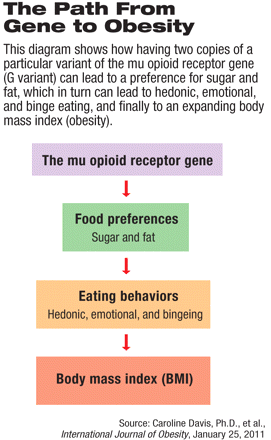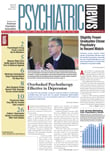Could obesity be due to a food addiction?
In some cases that is a distinct possibility, Nora Volkow, M.D., director of the National Institute on Drug Abuse, stated in an editorial in the May 2007 American Journal of Psychiatry. Obesity, she said, "is not only a metabolic disorder, but also a brain disorder... [and] we propose that some forms of obesity are driven by an excessive motivational drive for food and should be included as a mental disorder in DSM-V."
Since then, evidence has been building that some cases of obesity are indeed due to a food addiction. For example, the endogenous opioid system, which is implicated in alcoholism and heroin abuse, is also known to stimulate food intake. Opioid circuitry in both the nucleus accumbens and ventral palladium regions of the brain appears to mediate taste responses. Impulsivity and the tendency to act on cravings have been linked with higher mu opioid receptor concentrations and greater opioid system activation.
And recently people who possess two copies of a variant of the mu opioid receptor gene have been found to have a greater weakness for sweet and fatty foods than people who have only one copy of the variant or another variant of that gene. A preference for sweet and fatty foods in turn has been linked with emotional eating, binge eating, and hedonic eating (which the researchers defined as appetitive responsiveness to food independent of actual consumption). And these three types of eating in turn have been linked with obesity.
The findings were reported online January 25 in the International Journal of Obesity. The lead investigator was Caroline Davis, Ph.D., a professor of health at York University in Toronto, and the senior investigator was J.L. Kennedy, M.D., of the University of Toronto's Centre for Addiction and Mental Health.
Three hundred men and women aged 24 to 50 recruited from universities, hospitals, newspaper ads, and other venues took part in the study. The sample had a broad range of body mass index (BMI) values, with a distribution representative of the general adult population. None of the subjects had a psychotic disorder, an alcohol use disorder, a substance use disorder, or a serious medical illness.
Subjects filled out the Food Preference Questionnaire, indicating their preference for various foods on a nine-point scale. Subjects' tendencies to binge eat were evaluated with the Binge Eating Questionnaire. Their appetitive responsiveness to food—for instance, "If I see or smell a food I like, I get a powerful urge to have some"—was assessed with the Power of Food Scale. And their tendency to eat when prompted by emotions such as tension and worry was evaluated with the Eating Behavior Patterns Questionnaire.
Subjects were genotyped for the mu opioid receptor gene. A total of 226 of the subjects (75 percent) possessed two copies of the A variant of the gene, 62 (21 percent) possessed one A variant of the gene and one G variant of the gene, and the remaining 12 (4 percent) possessed two copies of the G variant of the gene.
The researchers compared the three gene groups on their preferences for sweet foods, fatty foods, or both and found that the GG group scored significantly higher on the preference for sweets, fatty foods, or both than the other two gene variant groups did. (The latter two groups' preferences for sweet and fatty foods were comparable.)
Moreover, they found that a preference for sweet and fatty foods was positively correlated with hedonic eating, emotional eating, and binge eating, and that all three of these forms of consumption in turn contributed to a subject's BMI.
It thus looks as if individuals with two copies of the G variant of the mu opioid receptor gene are particularly vulnerable to consuming sweet and fatty foods and ultimately to obesity—"a biological liability that is easily exploited in our fast-food culture and toxic-food environment," Davis and her colleagues stated.
Yet while having two copies of the G variant of the mu opioid receptor gene may explain certain individuals' obesity problems, it may be only a minor culprit in society's overall obesity crisis, Davis indicated to Psychiatric News. One reason for this belief is that only 4 percent of subjects in this study had two copies of the G variant of the gene. Another reason is that hedonic eating, emotional eating, and binge eating explained only 51 percent of the BMI of subjects in this study. In other words, "Lots of factors, most of which are probably unknown to us," explained the remaining 49 percent, Davis said.
The study was funded by the Canadian Institute of Health Research.

